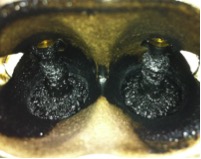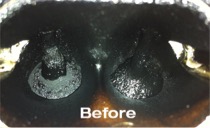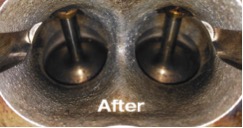The Problem with Direct Injection – Coked Up Valves
What is Direct Injection?
Direct injection technology has changed the way fuel efficiency is achieved, and it’s a method Volkswagen has wholeheartedly embraced in a bunch of their vehicles. They were introduced into the VW lineup beginning in the early 2000’s with the Jetta, Golf, and Audi A4. Now, direct injection is commonplace. You can tell which vehicle has direction with the acronym after the name – GDI, TFSI, FSI, and TSI are all varieties of direct injection.
.jpg)
Direct injection means exactly that: the fuel is injected directly into the combustion chamber. It’s unlike other fuel injection styles that spray fuel in the intake to mix with air BEFORE entering the cylinders. That achieves better power production and improved fuel efficiency, all because more air can flow into the engine’s cylinders.
Drawbacks of DI
There’s a drawback to direct injection, though. In a typical fuel injection model, the air/fuel mixture passes over the intake valves, keeping them clean and operating smoothly. In a direct injection engine, the detergent-laden fuel doesn’t pass over the valves at all, only air.
Over time, carbon buildup and oily sludge can form on the intake valves, which can make the valves stick, not seal completely, or not lift as high. It’s known as being coked up. That will end up being troublesome if it’s not attended to.

Symptoms of Coked-Up Valves
If your VW engine has direct injection, chances are good that over time your valves will experience carbon buildup. You’ll first notice that there could be a light misfire or rough run, and your Check Engine light will come on occasionally. When it gets really bad, you’ll have a dead miss in your engine and you’ll notice you have poor acceleration.
In really bad cases, pieces of the carbon can break off and find their way through the engine and into the exhaust where they embed in the catalytic converter. A tiny piece of carbon can cause your cat to burn out, and it will need to be replaced alongside your engine repair.
How to Deal with Coked-Up Valves
The best course of action is to prevent it from becoming a problem. Regular maintenance for direct injection engines should include a course of intake cleaning at least every 50,000 miles. A reputable shop (like L & M Foreign Cars) will have a product to professionally treat the issue so it doesn’t affect your performance.


If you have the symptoms already, running the engine treatment may not be enough. The intake manifold has to be removed and the valves have to be manually cleaned. It’s a pretty big job and it’s specialized, so you’re going to need a knowledgeable technician to do it for you, and definitely someone who’s familiar with Volkswagen engines.
Serving Brooklyn and the surrounding area, L & M Foreign Cars is the place to trust for your VW direct injection valve cleaning and repairs. We know your Volkswagen and have the tools and equipment to take care of whatever you might need, just like the VW dealer but without the excessive costs.